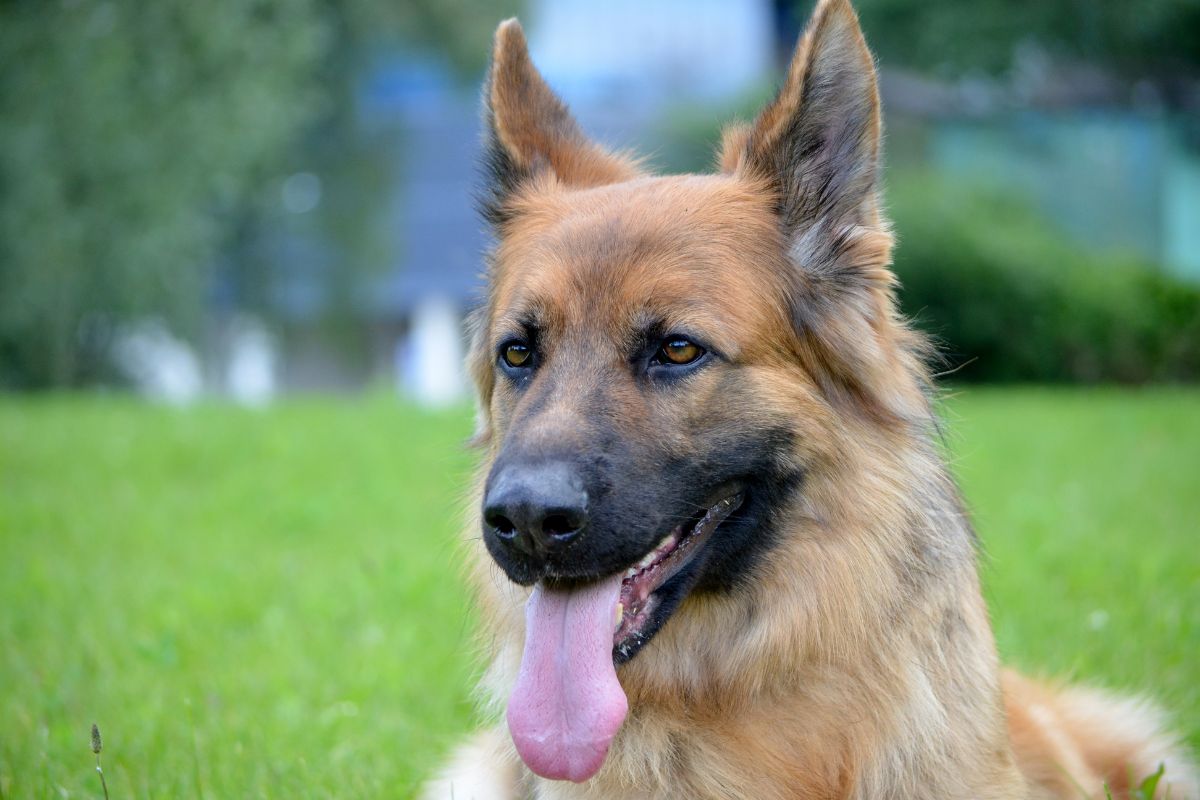Dogs are known to be very hostile, but are German Shepherds aggressive? The traits and mannerisms of the german shepherd breed are well-known. They are known for this behavior, which helps them create effective, powerful guard dogs.
This does not imply that you should support this aggressive behavior because it might be risky. Your dog might end up injuring someone or another dog.

GSD and Aggression
An aggressive German Shepherd is not an all-natural occurrence. Dogs can become aggressive if they lack proper socialization from an early age. Training and exposure to social skills from an early age can go a long way in helping your dog with aggression.
Indeed, most people do not view German Shepherds as just a pet but also as a form of security if adequately taught and given the care they deserve.
Are German Shepherds Aggressive?
Are female German Shepherds aggressive? If they are not properly socialized, both male and female german shepherds can be violent canines. This is because learning social tendencies is relatively easy. Their protective instincts are natural.
A GSD who has not been taught what “normal” is may constantly be on guard when engaging in routine activities and generally maintain an aggressive edge. German Shepherds once guarded sheep against wolves. Most of them are now house pets.
They may mix friendliness with caution because they naturally classify living beings as worth protecting. However, you must adequately socialize your German Shepherd and introduce them to various people and situations from an early age.
People won’t be as apprehensive around him when he’s a puppy, which is fantastic for his self-esteem and how he views people.
But if he develops a lack of social skills as a puppy, his demeanor will make people uncomfortable, which will reflect in the dog and start a vicious cycle that makes your German Shepherd more violent. You must first understand what makes a German Shepherd aggressive to prevent forming such a cycle of bad traits.
Are GSDs Dangerous?
Are German Shepherds dangerous? Bred as guard dogs, German Shepherds tend to be vicious. They, therefore, possess instincts for protection and territory that other dogs might not have. Simply put, a little Schnauzer does not possess the same instincts for protection as a German Shepherd.
That does not imply that German Shepherds are inherently dangerous, though. There are a lot of conflicting perspectives on this subject, as well as a lot of conflicting scientific evidence that supports both positions.
The majority of vicious German Shepherds bite because of their owners. To control their territorial impulses, German Shepherds must be socialized and trained. If not, they could develop territorial behavior toward people you don’t want them to, including family and friends.
Educating your German Shepherds is important. They should know that only some are enemies.
If owners fulfill this duty, then dogs are often not dangerous. When properly raised, these dogs may be incredibly gentle.
But not all German Shepherd owners behave responsibly. Adopting German Shepherds by owners who think they are “cool” or want a security dog already trained. These pups might not receive the interaction they require to flourish without the correct information.
Other owners, on the other hand, are entirely aware of the needs of the German Shepherd but find it challenging to meet those needs. In these situations, the socialization of the German Shepherd tends to level off as they age.
You may have heard people say, “my German Shepherd is becoming aggressive” this is simply because they might receive the attention they require as adults, but while they are puppies, they are frequently left alone. This makes them vulnerable to tempers and hence coined the term “dangerous” or “violent dog.”
Common German Shepherd Behavior Problems
Do German Shepherds’ behavior issues leave you wondering why they occur and how you can prevent future misbehavior? The following conduct issues are typical in German Shepherds:
- German Shepherds’ aggressiveness
- Chewing excessively or destructively
- Anxiety about separation
- German Shepherds’ urine marking
- Barking too much
Genetic Temperament
According to scientific research, the influence of genetic tendency to lousy behavior is by both hereditary and environmental factors. A study on genetic segmentation shows the behavior traits in German Shepherds, which supports the notion that a variety of genetic and environmental factors affect canine behavior.
Simply put, your German Shepherd may receive genes from their parents that predispose them to hostility, but this does not mean you cannot teach them to control the behavior. This is among the justifications for meeting the parents of your potential German Shepherd puppy.
Hormonal Effects
In male canines, there is a link between aggression and testosterone. According to this research, various hormones may be the root of canine aggression.
Both Vasopressin (AVP), which controls the volume of extracellular fluid and renal processing of water, and Oxytocin (OT), a hormone linked to social bonding and sexual reproduction, can have a negative effect on dog behavior.
The surgical removal of the female ovaries or the male testes is called a gonadectomy. Many pet parents think that neutered or sterile german shepherds are less hostile.
Except for those who had been neutered or spayed between the ages of 7 and 12 months, gonadectomized dogs in this fascinating study showed no noticeable increase in hostility. The basic conclusion is that hormonal fluctuation is the root cause of a dog’s behavior.
A Lack of Exercise
A German Shepherd needs at least two hours of exercise daily due to its high energy level. More than just leash walks apply to this! He will also require a lot of interactive and mentally stimulating play.
Your GSD will undoubtedly have behavioral problems if you try to turn him into a couch potato, most of which will take the form of hostile conduct.
This is the problematic side of owning a mighty German Shepherd. But before you give up, remember that you can resolve these typical German Shepherd behavior issues with positive reinforcement training, enough exercise, and the removal of triggers.

The Causes of GSD Aggression
Does this breed come with embedded aggression in its genetic makeup? The answer can be yes or no, depending on how you view it. Let me leave that to you to decide. A German Shepherd with aggression might:
- Stand rigidly motionless, very still.
- Make and maintain eye contact.
- Threatening growls or barks/ snarling
- Show its teeth
- Leap ahead without coming into contact
- Bite firmly enough to cause a skin break or a mark.
A German Shepherd may display any or all of these behaviors, or it may only give a warning by growling, snarling, adopting an aggressive stance, or showing its teeth, without actually biting, depending on the nature and severity of the stimulus that provoked the hostility.
Some of the following factors cause your dog to act most of the time aggressively:
Lack of Proper Training
Since some aggressive conduct is conditional, it appears odd. A German Shepherd may behave well yet become hostile to strangers. Inconsistent aggression, even if it doesn’t occur frequently, indicates a poorly taught dog.
Due to their ancestry as highly trained working dogs, they tend to be very predictable, even with regular training. However, if an owner unintentionally sends contradictory signals, the result is a well-behaved German Shepherd who occasionally displays unpredictable behavior.
Fear
An anxious German Shepherd is more likely to become hostile.
Most of them can be aggressive when they perceive danger, cannot flee and feel the need to defend themselves might happen. For instance, if a dog is trapped in a corner and has no way out or if it interprets a raised hand above its head as an impending blow.
Suppose your German Shepherd was rescued and is acting more aggressively or fearfully than usual. In that case, it may have been mistreated, abused, or gone through a traumatic event when it was a puppy.
You could decide on the best course of action with the assistance of whatever information you can obtain from the agency where you acquired the dog.
Rescue dogs occasionally require obedience instruction from a trainer with experience working with abused or poorly socialized dogs. You can control your dog’s fear in specific situations with training and persistence. A veterinarian can advise you on the best course of action.
To prevent inciting this kind of violent behavior, cautiously approach German Shepherds you don’t know, or better yet, let them come to you. To reduce future fear, socialize and train your dog.
Injury and Illness
Aggressive behavior in german shepherds can result from specific medical issues. This could result from a disease or illness if a dog who has never displayed aggression suddenly starts snarling, snapping, or biting. In german shepherds, pain is a prevalent trigger for hostility.
Your dog may suffer from severe injury or sickness that makes him suddenly aggressive. Arthritis, bone fractures, internal wounds, different cancers, and abrasions are a few potential causes of pain.
Other ailments that influence the brain in your dog could result in unreasonable hostility. Aggression may manifest as a result of infections, including brain tumors, illnesses, or cognitive dysfunction.
Although they can happen to dogs of any age, these issues are more likely to affect older animals.
How GSD Owners Encourage Aggressive Behavior
Make sure you’re doing it correctly when it comes to training your dog. You would need a professional trainer to help you figure out what is happening if your dog keeps getting into problems.
Unfortunately, owners often contribute to the German Shepherd’s lousy behavior. Here’s how:
Care and Attention
It goes without saying that negligent owners tend to overlook aggression in their dogs.
For example, an owner may think that a german shepherd that’s always snarling and barking is suitable for their security, but if left unchecked, it may one day harm the oner due to lack of proper distinction between right and wrong. This draws back to the owners.
Rehabilitation
People tend to think that you can pass on a dog from one owner to another without proper rehabilitation, especially German Shepherds that have been used solemnly for security purposes.
One may opt not to follow the correct procedures, contributing to the dog becoming aggressive and behaving hostilely.
Training
As the saying goes, “it’s never too late,” you can start training your dog at any point in its life to avoid or do away with aggressive mannerisms. It is, however, prudent to begin preparing your German Shepherd while still young.
Many owners may need to pay more attention to this as it might mean parting ways with some dollars to facilitate the training sessions.
Considerations and Solutions
In most cases, many people want a mean German Shepherd who can alert you when there is danger and even go the extra mile to offer protection.
One should find the root cause of the problem before considering any solution, as you may need to address the right issue. Taking a trip down to your local veterinary or visiting a well-known German Shepherd breeder with more insight than you might think can be of immense help.
When is the German Shepherd Not the Dog for You?
You can benefit greatly from owning a German Shepherd. They can, however, in some circumstances, make terrible pets.
Here are some reasons why a German Shepherd may not be the dog for you:
- Training is something you need more time for due to your busy schedule. These canines are not only very bright, but they also need training on appropriate behavior.
They will become disruptive in an effort to have fun if their minds when inactive. Therefore, even when they know all of the fundamental commands, you should still train them.
- You want to avoid dealing with health problems that come about from time to time, just like human beings. The misconception that purebred dogs are healthier than mixed-breed dogs is common.
Purebred dogs, particularly German Shepherds, are predisposed to several hereditary diseases. This breed is prone to many ailments, including hip dysplasia. Any dog can experience this kind of disorder.
You should only get a german shepherd if you are mentally ready to cater for its veterinary check-ups and bills.
- German Shepherds tend to shed a lot. They sometimes need to be brushed every day. You’ll need to brush them at the very least a few times every week.
Adopting a German Shepherd is only recommended if you fulfill this commitment. They are also prone to fleas and other insects on their bodies.
This draws back to you to cater to their hygienic needs, as proper grooming is essential.
- German Shepherd dogs require extensive socialization. If you don’t, they might start to feel threatened by everyone and lose their sense of security.
They must be exposed to a wide variety of people to learn that not everyone poses a threat. You want them to defend you and your family only from undesirable people, not from everyone.
- In general, German Shepherds live for about 10 to 14 years. You can only adopt a dog if you dedicate this much time to it.
If you relocate, have another child, or have any other life event, you shouldn’t think of getting rid of your dog because they tend to regard their owners as family, so try as much as possible to reciprocate the love they show you.
Controlling and Managing GSD Aggression
Are all German Shepherds aggressive? You should be happy to know that controlling your GSD aggression can be easy. Do you want to know how to manage an obnoxious German Shepherd? Fortunately, I’ve got your back with some suggestions to support you in handling it correctly.
For a start, you should come up with several ideas on how to make your dog triggers less intensive. It is important to note that the environment should be conducive, and a reward should be given to the dog whenever they remain neutral to intensive triggers.
You will need more time to train your aggressive German Shepherd. It will require a lot of effort and endurance. Increasing the trigger’s intensity too quickly could result in an angry reaction and undo all your previous hard work.
When dealing with an aggressive German Shepherd, yelling or using physical force is never a good idea. Because they are already outside their comfort zone, your German Shepherd will get more agitated under further stress.
It would be best to immediately correct your dog’s growling or snarling with a stern “no” when it occurs. Reward the dog with a treat if available at the precise training moment so that your dog understands the actions that lead to the reward.
When training an aggressive German Shepherd, safety must always come first. Consider a head halter or a muzzle depending on your dog’s aggression. It is more beneficial than you might realize.
When you have an aggressive dog, you must constantly be aware of potential trigger situations. A German Shepherd can tell when someone near it is nervous, tense, fearful, and protective.
Training to reduce aggression in a dog in this mental condition will ultimately be unsuccessful. If your dog is stressed, it will always learn to recognize its triggers.
However, when you are confident that your dog cannot harm anyone, you may act with confidence and tranquility, which will reassure your GSD.
You should take your German Shepherd to the vet if they suddenly become hostile. That’s because even though your German Shepherd appears healthy, it could be ill.
Dogs who are hurt are weak and fearful and may growl or attack to defend themselves. Underlying hormonal health issues may also bring on aggression in your dog. Therefore, any abrupt behavior change is a health red flag.
FAQs
What Does GSD Mean in Dogs?
A herding breed renowned for its bravery, loyalty, and guarding instincts is the German Shepherd dog, otherwise known as a GSD. It is an excellent guard, police, military, guide, and search and rescue dog. The German Shepherd is also a favorite family pet for many households.
Do German Shepherds Bite?
The German Shepherd is a lovable canine companion despite his enormous size and imposing demeanor, as he ranks as one of Americans’ most preferred dog breeds. Your German Shepherd will remain by your side and watch over you to the very end. He may even give his life defending you.
Nevertheless, he will never “turn” on you. If your German Shepherd is adequately socialized and trained from the beginning, he will never purposely bite you without provocation.
How Aggressive are German Shepherds?
German Shepherds rarely attack their owners or family because those are the people they are trying to defend. They may occasionally become too protective of their owner. Proper training can help control this behavior.

Parting Thoughts
Are German Shepherds aggressive breeds? German Shepherds tend to be aggressive. However, these are easy to teach and accept visitors into their domain with the correct socialization and training.
The purpose of a German Shepherd is not to be as pleasant as the typical dog. These pets, however, come with a lot of responsibility. You must be ready to devote a lot of time to their training and socialization.
If you buy this breed, expect to put in several hours each week because German Shepherds who are violent frequently have owners who don’t put in the work.
Before adopting a German Shepherd, be sure to give it some serious thought. How you behave will primarily influence whether they start acting aggressively.

